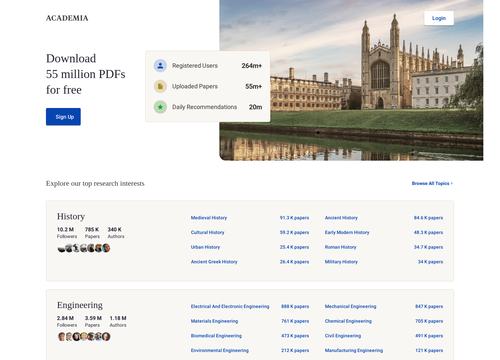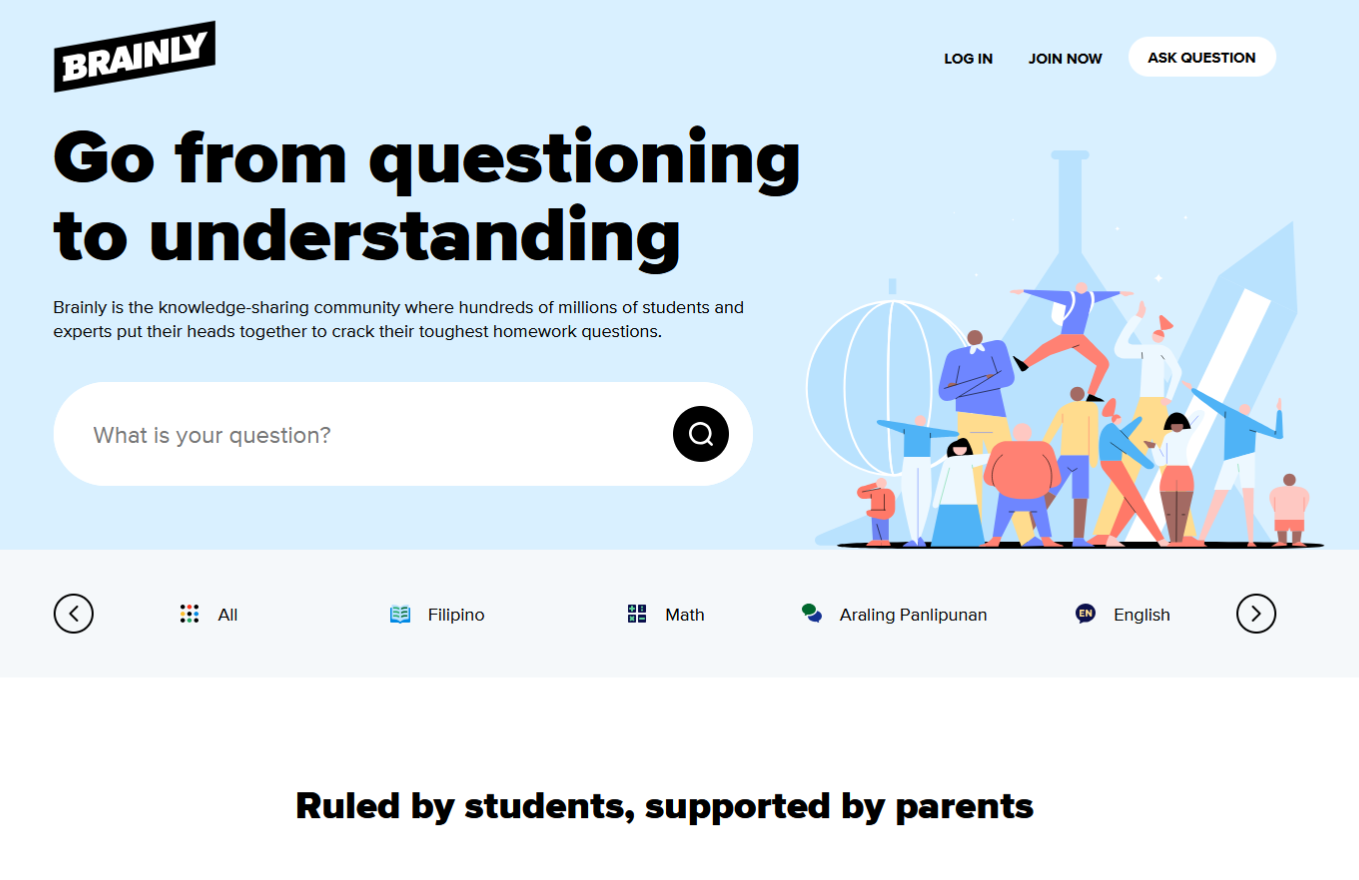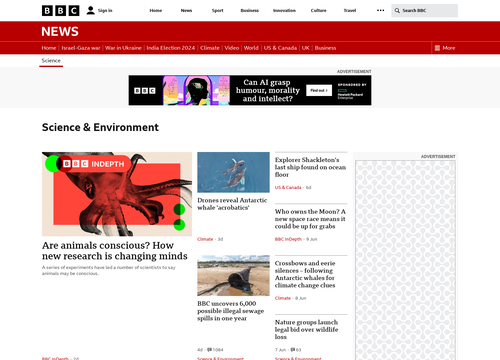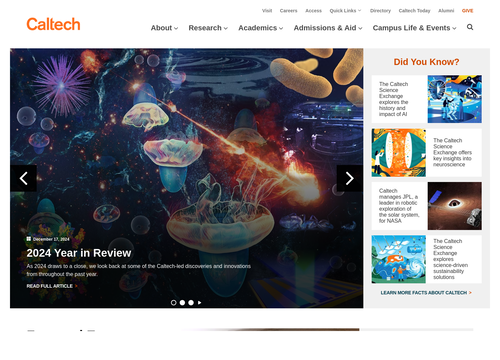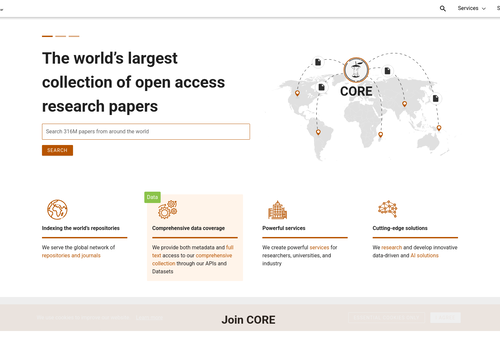Academia.edu
https://www.academia.edu/Academia.edu
Academia.edu is an online platform for academics to share research papers, connect with colleagues, and discover new research. Founded in 2008 by Richard Price, its primary goal is to facilitate open access to academic research and foster collaboration among scholars across various disciplines.
Key Features and Services
Research Sharing
Academia.edu allows users to upload and share their research papers, articles, and other academic documents. This sharing capability is integral to promoting the dissemination of knowledge and increasing the visibility of one's work.
Networking
The platform serves as a social networking site for researchers, enabling them to follow other scholars, join discussions, and stay updated on the latest research developments within their fields of interest.
Discovery Tools
Users can search for papers using various filters and receive recommendations based on their reading habits and interests. Academia.edu’s search functionality helps researchers find relevant papers quickly.
Analytics
Academia.edu provides authors with metrics and analytics on the performance of their papers. This includes the number of views, downloads, and citations, which provide users with insights into the impact and reach of their research.
Peer Review and Feedback
Researchers can receive feedback on their work from peers, fostering an environment of constructive criticism and improvement.
Academic profile
Users can create detailed academic profiles that showcase their publications, affiliations, research interests, etc.etc. This helps in building an online academic presence and connecting with like-minded researchers.
Benefits for Academics
Increased Visibility
By uploading their work to Academia.edu, researchers can increase the visibility of their publications, reaching a broader audience than traditional academic journals alone.
Open Access
The platform supports open access to research, making it easier for people around the world to access scholarly work without the need for expensive journal subscriptions.
Collaboration
Collaboration facilitates collaboration by connecting researchers who have similar interests or complementary expertise. This can lead to joint projects, coauthorship, and broader academic networks.
Timely Updates
Researchers can stay informed about the latest developments in their fields by following other academics and receiving notifications about new papers and updates.
Challenges and Criticisms
Quality Control
Unlike traditional journals, Academia.edu does not have a rigorous peer-review process before papers are published. This means that the quality and reliability of the research can vary significantly.
Commercial Aspects
Some critics argue that Academia.edu operates with commercial interests, as it offers premium features for a fee and uses algorithms to drive engagement and content visibility.
Data Privacy
Concerns have been raised about data privacy, as the platform collects extensive user data, which can be used for targeted advertising and other commercial purposes.
Academia.edu's Role in the Academic Ecosystem
Supplementing Traditional Publishing
Academia.edu complements traditional academic journals by providing a platform where researchers can share preprints, postprints, and even working papers. This can accelerate the dissemination of new findings, especially in fast-moving fields where timely access to research is crucial.
Interdisciplinary Exposure
By breaking down barriers between different disciplines, Academia.edu allows for interdisciplinary research to flourish. Scholars from diverse fields can discover and engage with work outside their immediate area of expertise, fostering innovative cross-disciplinary collaborations.
Global Reach
The platform democratizes access to research by making papers available to a global audience. This is particularly beneficial for researchers in developing countries who may not have access to expensive journal subscriptions and databases.
Educational Resources
Students and educators use Academia.edu as a resource for accessing a wide range of academic papers. It serves as a supplementary educational tool, providing additional reading materials and research examples that can enhance learning and teaching.
Advanced Features and Services
Document Sharing
Academia.edu supports a variety of document types, including PDFs, PowerPoint presentations, and Word documents. This flexibility allows users to share different kinds of academic content.
Mentions and Citations
Users can track how often their work is mentioned or cited by others on the platform, which helps gauge the influence and reach of their research.
Premium Features
Academia.edu offers premium features such as advanced analytics, increased visibility for uploaded papers, and enhanced search capabilities for subscription fees. These tools can be particularly useful for researchers looking to maximize the impact of their work.
Conference Pages
Academia.edu allows users to create and manage conference pages, providing space for sharing papers and presentations related to specific academic events. This feature supports the academic community in organizing and disseminating conference materials.
User Experience and Interface
Academia.edu boasts a user-friendly interface designed to make navigation and research discovery straightforward. Key elements include:
Homepage Feed
A personalized feed that shows updates from subsequent researchers, newly uploaded papers, and recommended readings based on user interests.
Search Functionality
Advanced search options allow users to filter results by relevance, date, type of publication, etc.,etc., making it easier to find specific documents or authors.
Notifications
Users receive notifications for various activities, such as when their papers are viewed or downloaded, when someone follows them, or when new papers are uploaded in their field of interest.
Academic Community and Networking
Academia.edu fosters a sense of community among scholars. Users can:
Follow Researchers
By following other academics, users can stay updated on their latest research activities and publications.
Groups and Discussions
The platform offers group functionalities where users can join discussions on specific topics, share insights, and collaborate on research questions.
Direct Messaging
Researchers can directly contact each other through the platform, facilitating easier communication and collaboration.
Future Directions
Academia.edu continues to evolve, with ongoing developments aimed at enhancing the user experience and expanding its services. Potential future directions include the following:
Enhanced Peer Review Systems
Implementing more robust peer review mechanisms to ensure higher quality and reliability of shared research.
Integration with other platforms
Collaborating with other academic tools and databases to create a more seamless research ecosystem.
Greater Accessibility
Expanding efforts to make research more accessible, including supporting more languages and improving accessibility features for users with disabilities.
Conclusion
Academia.edu has established itself as a significant player in the academic landscape, providing valuable tools for sharing research, networking, and discovering new knowledge. While it faces challenges related to quality control and commercial interests, its benefits in promoting open access and global collaboration are substantial. As it continues to grow and adapt, Academia.edu is poised to play an increasingly important role in the future of academic research and communication.




















